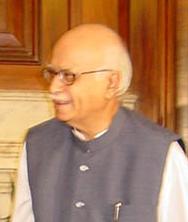Lal Krishna Advani
|
|

| This article or section contains information about a current or ongoing event. |
| Information may change rapidly as the event progresses and may temporarily contain inaccuracies, bias, or vandalism due to a high frequency of edits. |
Lal Krishna Advani (born November 8, 1927/1929, Karachi) is an Indian politician.
Advani is the President of the Bharatiya Janata Party (BJP) and Leader of the Opposition in the 14th Lok Sabha. He is a prominent figure in his party and was the Deputy Prime Minister and Home Minister in the Indian government (1998-2004). Many consider him, rather than Atal Behari Vajpayee, to be the most influential figure in the party due to the latter's old age and failing health.
Advani was born on November 8, 1929 in Karachi (now in Pakistan). His early schooling was at St.Patrick's in Karachi. He later on graduated in Law from Bombay University. Though not a practising lawyer, he argued on behalf of his party in 1974 before the Supreme Court in the Presidential reference whether election to the post of President could be held when the Gujarat Assembly was dissolved.
From 1970 to 1989, he was a member of the Rajya Sabha. In 1989 and again in 1991, he was elected to Lok Sabha and in 1991, he was elected Leader of the Opposition in the Lok Sabha.
The Babri Mosque demolition was the culmination of a decade-long movement by the BJP the party Advani led which came to realise that by raising the issue of the Ram Temple they could mobilise the Hindu voters for their political party. This process achieved their goal but also polarised Indian society like never before.
Condi_rice_with_advani.jpg
In appearances before the Liberhan Commission, a judical body set up to investigate the Babri incident, Advani claimed that the demolition was the most agonising moment of his life.
The Ayodhya site is claimed by both Hindus and Muslims. A mosque there was torn down by Hindu activists in 1992, sparking riots nationwide that cost 2,000 lives.
Hindus consider Ayodhya a very sacred place since Lord Ram was born there.The disputed mosque was built on the site of an earlier grand temple dedicated to Lord Ram.
Speaking to correspondents on his appointment as President of BJP, Advani said: "We must be candid enough to recognise the Hindu anger that exploded on the streets in the early 1990s has given way to a patient wait for the new temple whose construction, I feel is inevitable."
Resignation controversy over Jinnah remarks
On June 7, 2005, Advani offered his resignation from his post as BJP President amid controversial comments he is said to have made during a trip to Pakistan. He became the first major Indian political leader to visit Jinnah's mausoleum, on June 4 and he wrote in the visitors' book:
- There are many people who leave an irreversible stamp on history. But there are few who actually create history. Qaed-e-Azam Mohammed Ali Jinnah was one such rare individual. In his early years, leading luminary of freedom struggle Sarojini Naidu described Jinnah as an ambassador of Hindu-Muslim unity. His address to the Constituent Assembly of Pakistan on August 11, 1947 is really a classic and a forceful espousal of a secular state in which every citizen would be free to follow his own religion. The State shall make no distinction between the citizens on the grounds of faith. My respectful homage to this great man.
This was reported in the Indian media as Advani terming Jinnah as a "secular" leader. Both Hindu nationalist groups aligned with the BJP and officials from the ruling Congress party lashed out against Advani for his statements. The leaders of the BJP party tried to persuade Advani to take back his resignation, a suggestion Advani refused. A memorandum was presented to Advani by the partymen hailing his trip to Pakistan without any reference to the Jinnah speech. Advani rejected this memorandum yet again.
While Pakistan was cautious, some Pakistanis saw it as Advani's ploy to shed his hawkish image which seems at odd with the times. In its editorial, The News said "His remarks have certainly given him a new look among the Pakistani people, who otherwise would reject him as a hardcore radical with nothing good to contribute to peace." while others saw this as posturing on Advani's part to widen his appeal to the Indian masses to appear as a prime minister in waiting.
The chief of the hindu RSS (Rashtriya Swayamsevak Sangh) acknowledged Advani's contributions as party president without referring to the Jinnah incident while another senior leader of BJP, Murali Manohar Joshi opined that the party ideaology could not be diluted.
On 10'th June 2005, L.K Advani took back his resignation. Sushma Swaraj, a BJP party leader said at the end of the party's parliamentary board meeting "During the last four days there was a crisis gripping the party after Advani's resignation, which was unequivocally rejected. It is now over."
Amongst those present in the board meeting were former Prime Minister A.B Vajpayee and former union minister Murali Manohar Joshi. The board adopted a resolution starting Jinnah to be the pursuer of the two nation theory which eventually lead to the partition of Indian subcontinent into India and Pakistan. However, the controversial visit of L.K Advani to Pakistan was declared to be a success.
External links
- Profile on website of BJP (http://www.bjp.org/leader/advaniji.htm)
- Profile (http://news.bbc.co.uk/2/hi/south_asia/2075803.stm) by BBC News dated April 16, 2003
- Pakistan expresses shock at Mr Advani's resignation (http://www.hindustantimes.com/news/181_1391007,001300270001.htm)
- Advani takes back his resignation from BJP Presidentship (http://news.webindia123.com/news/showdetails.asp?id=87480&cat=India)

